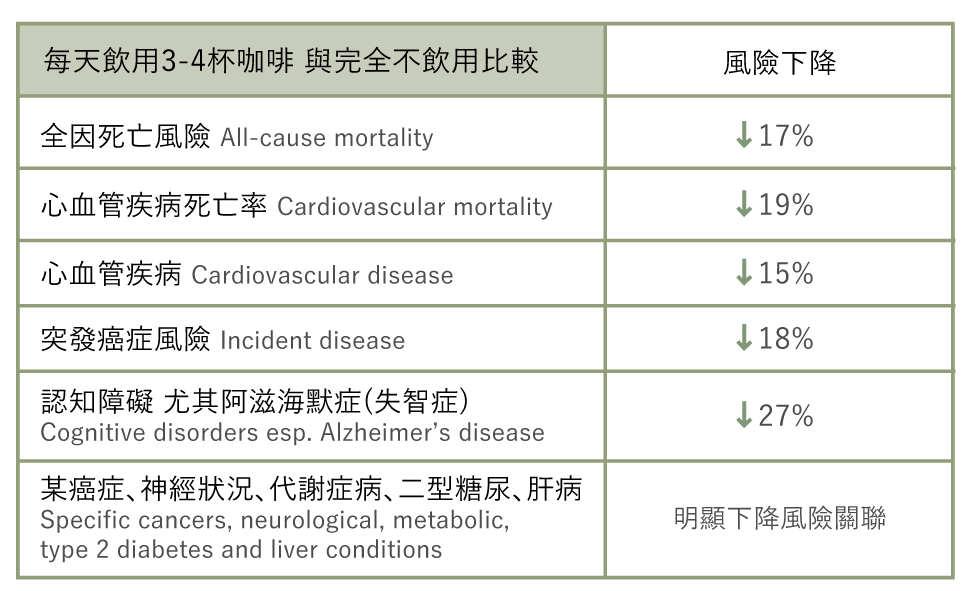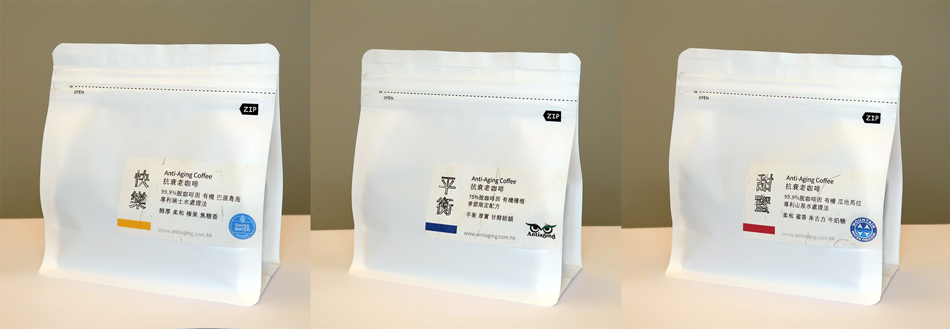Anti-aging Coffee
Coffee contains thousands of antioxidants, and numerous medical studies over the past decade have pointed out that regular coffee consumption has positive effects on anti-aging, maintaining cerebrovascular health, controlling blood sugar, and reducing mortality rates.
A large-scale multinational European medical study on coffee released in 2017, "Coffee Drinking and Mortality in Ten European Countries – the EPIC Study," is highly valuable. The study followed more than 520,000 people for up to 16 years, with more than ten European countries participating. At the same time, the study tracked the participants' dietary habits (consumption of red meat, processed meat, fruits and vegetables), body weight BMI, body size, exercise level, smoking habits, education level, physiological/menopause conditions, and whether they were undergoing other drug treatments. The study also recorded their physiological indicators (biomarkers), such as liver function serum indices, inflammation indices, metabolic indices, and other series of lipoprotein serum level indices.
The study found that:
- Compared to those who do not drink coffee, regular coffee drinkers have a statistically significantly lower all-cause mortality rate, regardless of the above-mentioned lifestyle habits;
- Simultaneously, the death rates from digestive system diseases, cerebrovascular diseases, and circulatory system diseases are significantly reduced;
- For those who drink 3 or more cups of coffee per day, the risk of death from all causes is reduced by about 8 - 18%;
- In summary, drinking a moderate amount of coffee (1 - 4 cups per day), and decaffeinated coffee, in particular, significantly reduces the risk of death;
- Regarding the impact on liver function diseases, coffee consumption shows a very significant anti-fibrosis effect, reducing fat accumulation, providing antioxidant effects and preventing inflammation;
- Regarding the association with cerebrovascular diseases, the study shows that coffee consumption can significantly reduce the risk of stroke, with the data being particularly clear for women;
- Japan also found an inverse relationship between coffee consumption and the risk of death.
The National Institutes of Health–AARP Diet and Health Study, "Association of Coffee Drinking with Total and Cause-Specific Mortality" (NIH-AARP study) is another large-scale research study (lasting 14 years from 1995 to 2008, tracking over 400,000 people during this period):
- Regular coffee consumption has a significant relationship with a reduced risk of death, including reducing the risk of heart disease, respiratory diseases, stroke, accidental injuries, diabetes, and other infections;
- Compared with those who do not drink coffee, coffee consumption reduces the comprehensive mortality rate (Total and Cause-specific Mortality) as follows:

Additionally, the highly respected British Medical Journal published a comprehensive study on coffee consumption and health in 2017, led by an expert professor in the field of public health, titled "Coffee consumption and health: umbrella review of meta-analyses of multiple health outcomes". The greatest benefits to the body were seen with an average daily consumption of 3 - 4 cups of coffee. The study shows:

The summary of cross-national and cross-year combined research from Europe, the United States, and the United Kingdom is as follows:
- Moderate coffee consumption is generally considered safe and beneficial to the body, with more advantages than disadvantages, and can be regarded as a beverage for reducing the risk of diseases.
- Coffee contains a large number of antioxidants, including chlorogenic acid, diterpenes, cafestol, kahweol, caffeine, etc. They can promote carcinogen detoxification within the body, stimulate the body's antioxidant defense mechanisms, and resist inflammation. The association with a reduction in the risk of liver fibrosis, cirrhosis, and liver cancer is the most significant.
- The quantity of antioxidants that can be ingested from drinking coffee every day is higher than that from drinking tea or eating fruits and vegetables.
- Compared to those who do not drink coffee at all (any versus no coffee consumption), coffee drinking can reduce the risk of many diseases.
- Compared to low consumption, moderate to high consumption further reduces the risk of many diseases.
- Drinking 3 - 4 cups of coffee a day is the most effective in reducing the risk of the aforementioned diseases.
- Compared with caffeinated coffee, decaffeinated coffee can also reduce the risk of many diseases.
Starting to drink coffee and increasing the amount of coffee one drinks is an effective key to combat aging, resist inflammation, and reduce the risk of a series of diseases. The choice of coffee type, roasting method, storage time, brewing method, and caffeine intake will all bring different effects to the body.
The following are the author's suggestions:
- After coffee beans are roasted at high temperatures, their composition and structure continue to change, gradually volatilizing their antioxidant components and decomposing carbon dioxide. Therefore, freshly roasted coffee beans, ground and enjoyed immediately, will retain more antioxidants than commercially stored coffee beans/powder, and the benefits and flavor will be better.
- Avoid drinking instant coffee. Generally speaking, instant coffee contains less than 5% coffee, and the rest is mostly milk, sugar, flavorings, and preservatives. Drinking 3 - 4 cups of instant coffee a day leads to excessive intake of sugar, milk and chemical additives, which could have undesirable consequences.
- Studies show that both decaffeinated and caffeinated coffee have excellent health effects. To increase coffee consumption to 3 - 4 cups a day, it is recommended to drink decaffeinated coffee or coffee with no more than 50% caffeine.
- For decaffeinated coffee beans, it is recommended to choose organic beans with traceable origins, processed with non-chemical solvents such as the Swiss Water Processed TM and Mountain Water Processed methods.
- Brewing methods: French press, hand brewing, and espresso are all good. Use hot water at 85 - 92 degrees Celsius to fully extract the beneficial substances from freshly ground coffee beans, avoid drinking overheated coffee, and try to reduce the addition of sugar and milk.
- Glass or ceramic (non-plastic) vessels are recommended for serving. The French Press or hand brewing with a filter paper are the simplest, most economical, and convenient methods.
The local coffee culture primarily focuses on equipment, brewing data, and the pursuit of visual and taste enjoyment, often overlooking the importance of the quality of the beans. In light of this, we're introducing a new option, Anti-Aging Coffee. It's freshly roasted in small quantities and available for pre-ordering. This made-to-order approach provides a new option for combating aging and promoting a healthier lifestyle.。
The unique features of Anti-Aging Coffee
- Based on several comprehensive studies, the roasting method and coffee bean processing procedure refer to existing medical literature, aiming to produce coffee with the most powerful anti-aging functions.
- Quality coffee beans, organically grown, with traceable origins, patented decaffeination method, and no chemical solvents added.
- 100% real coffee, natural ingredients, no artificial synthetic additives/flavorings/preservatives, and not a synthetic instant coffee powder.
- If you don't like drinking coffee, consider it as an effective anti-aging beverage that has great health benefits. Drinking it once to several times a day can greatly benefit your health.
- Fight aging, live healthily, starting with enjoying quality Anti-Aging Coffee.
預訂Order now contact us at (852) 3996 9618 or WhatsApp (852) 6938 6380。

Note: Instant coffee powders containing NMN ingredients have appeared on the market, attempting to deceive consumers. For more details, please refer to this article.
Reference:
1. Coffee consumption and health: umbrella review of meta-analyses of multiple health outcomes. BMJ. 2018;360:k194. Published 2018 Jan 12. doi:10.1136/bmj.k194
2. Gunter MJ, Murphy N, Cross AJ, et al. Coffee Drinking and Mortality in 10 European Countries: A Multinational Cohort Study. Ann Intern Med. 2017;167(4):236-247. doi:10.7326/M16-2945
3. Freedman ND, Park Y, Abnet CC, Hollenbeck AR, Sinha R. Association of coffee drinking with total and cause-specific mortality [published correction appears in N Engl J Med. 2012 Jul 19;367(3):285]. N Engl J Med. 2012;366(20):1891-1904. doi:10.1056/NEJMoa1112010
Remark: Pregnant women, women at high risk of fractures, or individuals with specific health conditions need to consider the impact of consuming large amounts of coffee. Please consult with your family doctor or a medical professional for advice.
備註: 懷孕或部份存在高骨折風險之女性, 或存在個別特殊健康狀況之人士, 需注意衡量飲用高量咖啡之影響, 請參考家庭醫生/ 專業人士意見。
